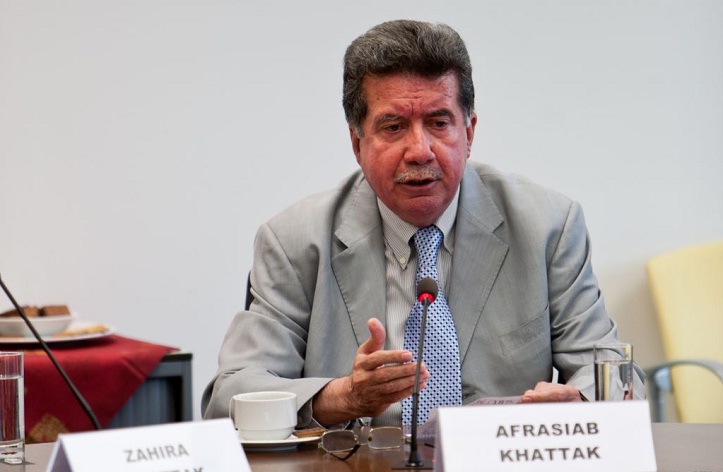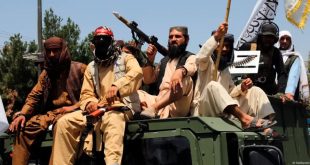By Afrasiab Khattak-The creeping coup has taken quite a long time to reach the endgame.
It all started soon after the newly elected government of Muslim League led by Nawaz Sharif assumed power after winning the general election in 2013.
The fault lines between the elected civilian government and the so-called permanent state (security establishment) appeared quite soon.
The first issue that led to a rift between the two sides was the determination of Nawaz Sharif to normalize relations with the neighbors in general and with India in particular.
The policy of reconciliation with India is a red rag to the security establishment as a confrontation with the big neighbor to the east is the ideological basis of the security state and a justification for the hegemony of security establishment over the state system.
The second issue that polarized relations between civilian and military branches of the state were the decision of Nawaz Sharif government to put the former military dictator General (r) Pervez Musharraf on trial for abrogating the Constitution.
General Musharraf has the dubious distinction of abrogating the Constitution twice; first in 1999 and again in 2007.
The government wanted to put him on trial for the second abrogation because unlike other cases in the past, the Supreme Court neither upheld the abrogation in 2007 nor was it later condoned by the Parliament.
So it appeared an open and shut case.
When the Special Tribunal decided to indict Pervez Musharraf in the high treason case, the retired general took refuge in a military hospital and refused to appear before the court.
After a brief standoff between state institutions, the former dictator was allowed by the court on “ medical grounds” to go abroad after some behind the scene manipulations.
Once out of the country, General Musharraf wasn’t shy of saying on record that he was helped by the former Chief of Army Staff (COAS) General Raheel Sharif in going abroad.
Be that as it may, these developments made the gap between the elected government and the security establishment unbridgeable and the later decided to go for the former.
Most of the older political parties had learned their lesson in the musical chairs game of 1990.
But Imran Khan of the PTI was prepared to lend his shoulder to the deep state for use against Nawaz Sharif government in hope for a shortcut to power through political engineering.
The sit-in in 2014 against “ rigged elections “ was phase one.
The nerve center of the civilian power in Islamabad was under a menacing physical siege for months.
Parliamentarians and Supreme Court judges had to reach their chambers through back doors as the main gates were occupied by putschists who were publicly declaring their allegiance to the umpire who was expected to raise his finger for sending the elected Prime Minister (PM) back to the pavilion.
The rabble-rousers to justify the intervention of anti-democratic forces attacked state television station.
Not only that.
Now we know that special messengers had also called upon the PM warning him to resign or be prepared to face the music of the martial law.
But that was not to be for two reasons.
One, most of the political parties rallied around the Constitutional system and publicly declared to unite against the putsch.
Two, the PM kept his nerve and refused to bow to the machinations of the deep state.
After the horrible massacre of school children and teachers in APS Peshawar in December 2014 in a terrorist attack, the putschists were forced to back off.
But as we learned later, the retreat was temporary.
They were waiting for the first available opportunity.
Leakage of Panama Papers in 2015 provided what was later called a God-given opportunity by the putschists.
The deep state and its cheerleaders pounced on this opportunity in the name of “ accountability, “ and the creeping coup that had started in 2014 found a way to enter the next stage.
As the contours of the endgame are now emerging the irony is crystalizing.
After all, it is the same old game.
“Accountability” has been the main political plank of all the putschists for showing the door to civilian government, from Ayub Khan to Zia-ul-Haq and Pervez Musharraf.
The only difference is that the process would start after the dismissal of the civilian set up but this time rounds a sitting Prime Minister has been targeted by successful political engineering of the deep state.
Probably after 18th Constitutional Amendment (2010), there is no room for direct open interference by the non-democratic forces.
So the higher judiciary equipped by JIT had to do the job.
But the job is done quite crudely.
Out of hundreds of names in Panama Papers, only one family has been singled out for “accountability.
” As if that wasn’t enough, the deepest irony is that after so much sound and fury over Panama Nawaz Sharif wasn’t disqualified on it.
He was disqualified over a UEA stay visa and the proposed salary from his son’s firm that wasn’t withdrawn by him.
Even after his ouster, the siege of the government is intensifying, and it is quite evident that this government will not be allowed to hold Senate’s election in March 2018 and general elections after that.
The ground is being paved for some “ caretaker” set up.
Efforts for creating yet another king’s party are now a matter of public knowledge.
Remarks by the Chief Justice about receiving “ calls from the public “ for taking action indicate the direction of the unfolding situation.
In the past higher judiciary would be used to uphold the decision by the deep state for removing the civilian government.
This time around it will be the advanced contingent in removing the civilian setup.
The answer to the following two questions can determine the outcome of the next round of the power politics.
One, Nawaz Sharif during the last four years weakened himself by sidelining the Parliament and by ignoring the significance of alliance among democratic forces.
Has he learned his lessons and will he behave differently in the new round? Two, Pakistan is facing severe prospects of international isolation on the question of extremist militancy in the country.
Will the security establishment, which cannot deny links with the elements as mentioned earlier anymore, is willing to or capable of jettisoning this liability?
The writer is a retired Senator and an analyst of regional affairs.
 Afghanistan Times
Afghanistan Times




